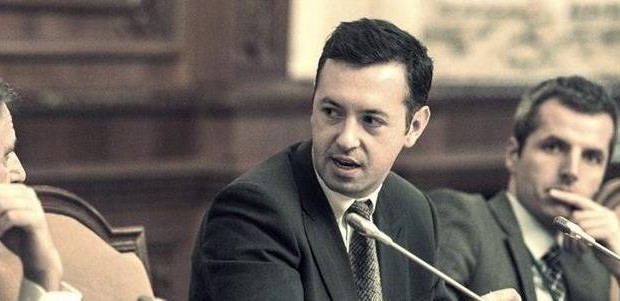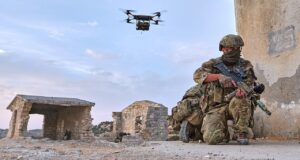Simon Schofield – Senior Fellow interviews Colm Lauder
3rd April 2014. Security and Defence, Issue 1, No. 4.
HIC Interview with Colm Lauder, Secretary General of the YEPP
.
As reports emerge of a growing sense of unease in Moldova and the Baltic States, the HIC thinks it is critical that we ask what recent events in Crimea signal for the eastern frontiers of Europe as a whole. Here, we present to you our interview with Colm Lauder, currently the Secretary General of Europe’s largest political youth organisation, the Youth of the European People’s Party (YEPP).
Originally nominated as the Fine Gael candidate by Irish Prime Minister Enda Kenny, Colm was elected in May 2013 at the YEPP Congress in Sofia, with over 1.6 million Europeans voting. As part of his YEPP role, Colm has been invited to act as an external advisor and speaker at a number of European institutions, think-tanks and NGOs. This has included a leading American think-tank, the National Democratic Institute, where Colm assisted in developing youth employment initiatives in the Balkan region. He has worked closely with EPP-partner organisations in Ukraine, Moldova, Georgia and the Baltics. On the eve of the signing of the Eastern Partnership Association Agreement in 2013 with the Ukraine, Colm led a YEPP Mission to Kiev meeting leaders from Batkivshchyna, Udar and Democratic Alliance.
Q: Should the Crimea be a part of the Russian Federation?
A: No. As far as the EPP and YEPP, including myself, are concerned, the referendum was against international law and under no circumstances should be recognised as legitimate.
Q: Do the situations in Moldova and Estonia suggest further opportunities for Russian expansionism?
A: Given its very close links to Romania, Moldova is difficult to judge as a country unto itself, though it is encouraging that it has been on a charm offensive with NATO/EU in recent years. The Transnistria region is effectively still a Soviet satellite state; it even retains the hammer and sickle on its flag. This is something that is worrying, but fortunately the region shares no land border with Russia, which makes annexation somewhat difficult and logistically complicated. However, South Ossetia in Georgia is currently voicing significant concerns about Russia and should be considered more vulnerable than Moldova and the Baltic States. The EU and the West played their cards quite poorly with Georgia and also with the Crimea. At this point, sanctions on Russia need to be effective to preclude further Russian expansionism.
Q: How do the Baltic States see the situation?
A: The Baltic states are and should be concerned about Russia’s intentions at the moment. However, being both EU and, more crucially, NATO member states, they have a credible deterrent against Russian incursion and are untouchable unless Putin decides to be very foolish.
Q: Should the European Union fast-track Moldova’s accession to deter the Russians from aggressive foreign policy actions against Moldova?
A: I don’t think the EU should fast-track Moldova’s membership more than it already has. It would be bad for both the EU and Moldova if they were to join before they were ready. What does, nevertheless, need to happen is that Moldova should be given EU assistance to prepare for accession, as was given to Romania and Bulgaria. With Russia’s behaviour as it currently is, it is vital this happens as quickly as possible. We need to make a broad political commitment to be ready to accept them as soon as they are ready. We also need to offer political, economic and technical assistance as soon as possible to help them tackle significant governance issues such as endemic corruption and development of the judicial system. Additional assistance we could offer in the form of trade and visas.
Q: What does Russia’s new assertive posture mean for fledgling democracies in Eastern Europe?
A: Russian behaviour has been destabilising for Eastern Europe. Even more developed countries like Poland and Hungary are feeling destabilised as a result of Russia’s foreign policy in recent weeks. From a democratic perspective, fearful overreactions could force undemocratic reforms in these countries to avert Russian aggression. This could take the form of heightened security measures or possibly also threats to judicial independence, neither of which are remotely positive for democracy. A further worry, as we have seen in Ukraine, is that Russian influence could drag national politics to the right in affected countries. Ultranationalist, hard-right parties coming to the fore in Eastern Europe is something to be wary of.
Q: How should the European Union respond to Russia?
A: The European Union requires a strong and united response to Russia. If member states are disunited, Russia will attempt to drive a wedge between them and play a ‘divide and conquer’ strategy. We are already seeing some disunity: Whitehall and some others are being cautious and reluctant to implement strong sanctions. The proportion of Russian GDP derived from exports to the EU is higher than the proportion of EU GDP that comes from trade with Russia, meaning sanctions are likely to have a stronger impact on the Russian economy than on Europe’s. This said, some European countries have stronger trade links than others to Russia; and the EU should be prepared to share the pain more broadly in order to maintain a strong sanction regime. Baroness Ashton has shown weak leadership on this issue. What is needed now are across the board asset freezes, wide visa restrictions and strict prohibition on military and technological exports to the Russian Federation. The French, for example, have a contract to build vessels for the Russian navy; this ought to be scrapped. Russia is already having to use some of its foreign reserves in order to pay for some of its recent military measures.
Q: What does the future hold for Western Ukraine in relation to Europe?
A: Following the Orange Revolution, there was a democratic election, but none of the sweeping reforms that one might have hoped for. There is now, however, an appetite for reform in Ukraine, and we should act whilst this appetite is strong. It will be a long process of reform in Ukraine, which could take a decade or longer, but this may eventually lead to closer EU ties. Ukraine needs to swiftly sign the EU Association Agreement, after having held transparent, free and fair elections. They also need to tackle the broad and rampant corruption in the judiciary, businesses and government. In order to expedite this process, Ukraine needs our full political, economic and diplomatic assistance.
Q: What role do you feel EU Association Agreements will play in the developing standoff between Russia and the West?
A: They will intensify the conflict from a Russian/Ukrainian viewpoint. Russia’s eastern bloc arrangement is meaningless without Ukraine as a vital strategic asset, which has many gas pipelines from Russia passing through it. Consequently, we can expect future Russian provocations and diplomatic and covert attempts to derail this process. Russia will likely also use energy and gas as weapons against Ukraine and others; however, Russia cannot afford to do this in the long term. They receive too much income from the sale of gas and energy to Western nations to be able to withhold it for long. However, the EU needs a stronger leader than Baroness Ashton to handle this issue.
Q: If Russia is embarking on a new expansionist agenda do you believe they will take a ‘death by a thousand cuts’ approach or attempt to seize and annex several provinces almost simultaneously?
A: Russia is likely to be trying its hand one country at a time. South Ossetia is a concern, as is Georgia. Again, Transnistria in Moldova has no land border with Russia, so it is not likely they will be annexed any time soon.
Q: How might all this affect future EU-Russian relations?
A: The big fear is that unless the EU is unified, it is pointless having Hague/Ashton or any other government officials speaking alone. There needs to be a strong and consistent voice. Ashton has been a weak leader on this and Syria and Libya. Hopefully her replacement will be stronger. This lack of leadership could cause internal disagreement within the EU. Russia will try to drive a wedge between member states. Euroscepticism is dangerous on this issue, because it will also contribute to disunity, giving Russia an opportunity to make political gains at the expense of all of us.
Simon Schofield is contactable at:
Simon.Schofield@hscentre.org
Please cite this article as:
Schofield, S. (2014). ‘Russia and the Eastern Frontiers of Europe’
Human Security Centre, Defence and Security, Issue 1, No. 4.
 Human Security Centre Human Rights and International Security Research
Human Security Centre Human Rights and International Security Research




